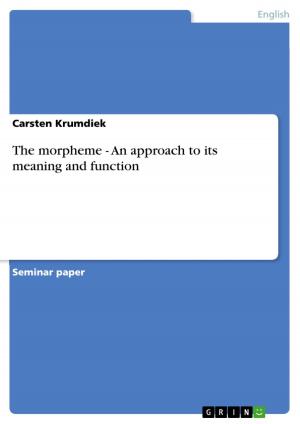How was the behavior of the US in Foreign Policy from 1917 till the end of the Vietnam War and what are the different possibilities?
Nonfiction, Entertainment, Drama, Anthologies| Author: | Julia Mahr | ISBN: | 9783640148318 |
| Publisher: | GRIN Publishing | Publication: | August 28, 2008 |
| Imprint: | GRIN Publishing | Language: | English |
| Author: | Julia Mahr |
| ISBN: | 9783640148318 |
| Publisher: | GRIN Publishing |
| Publication: | August 28, 2008 |
| Imprint: | GRIN Publishing |
| Language: | English |
Seminar paper from the year 2005 in the subject American Studies - Culture and Applied Geography, grade: 2,0, Friedrich-Alexander University Erlangen-Nuremberg (Lehrstuhl für Auslandswissenschaft), course: Proseminar: Introduction to the American Political System, language: English, abstract: 'There is no power that has influenced international politics that much as the United States of America. Their behavior in the whole world, their initiative and achievements, but also their faults and omissions influenced the fate of almost every Nation in the whole world.' 1 The United States of America are the only superpower left after the Cold War. Their power is the result of a historical development. To understand their Foreign Policy it is necessary to have a closer look at their behavior through history. '[As] America has always been a nation of immigrants [...] [and] [...] started as an experience in democracy fueled by Europeans' 2 the relations to other countries are multicultural and something special. 'The systematic divisions between the United States and Europe on world affairs thus began before 9/11, and even before the arrival of the Bush administration. But the terrorist attacks on New York and Washington vastly accelerated those trends and expanded the gap between the American and European approaches.' Everybody has the horrible pictures of the terror-attacks of September 11th in mind and knows that this has changed the international situation more than ever before. And especially inside Germany the acting of the Unites States was not always seen to be the right thing. But as the United States of America also were the main power to built up Germany after the Second World War, I think its only fair to judge their acting not before having a closer look at their historical behavior in Foreign Policy. And so the central question of my seminar paper is how the behavior of the United States in Foreign Policy was from 1917 till the end of the Vietnam War and what their different possibilities were. Therefore I will explain at first by which principles Foreign Policy can be guided so that I am able to have a look at different historical events during my seminar paper and try to make a decision whether this has been an Internationalist, Isolationist, Unilateralist or Multilateralist phase. As the Foreign Policy isn't guided by being a special phase it will not always be possible to say if it is exact the one or the other. But I will try to gain a precise view as often as possible.
Seminar paper from the year 2005 in the subject American Studies - Culture and Applied Geography, grade: 2,0, Friedrich-Alexander University Erlangen-Nuremberg (Lehrstuhl für Auslandswissenschaft), course: Proseminar: Introduction to the American Political System, language: English, abstract: 'There is no power that has influenced international politics that much as the United States of America. Their behavior in the whole world, their initiative and achievements, but also their faults and omissions influenced the fate of almost every Nation in the whole world.' 1 The United States of America are the only superpower left after the Cold War. Their power is the result of a historical development. To understand their Foreign Policy it is necessary to have a closer look at their behavior through history. '[As] America has always been a nation of immigrants [...] [and] [...] started as an experience in democracy fueled by Europeans' 2 the relations to other countries are multicultural and something special. 'The systematic divisions between the United States and Europe on world affairs thus began before 9/11, and even before the arrival of the Bush administration. But the terrorist attacks on New York and Washington vastly accelerated those trends and expanded the gap between the American and European approaches.' Everybody has the horrible pictures of the terror-attacks of September 11th in mind and knows that this has changed the international situation more than ever before. And especially inside Germany the acting of the Unites States was not always seen to be the right thing. But as the United States of America also were the main power to built up Germany after the Second World War, I think its only fair to judge their acting not before having a closer look at their historical behavior in Foreign Policy. And so the central question of my seminar paper is how the behavior of the United States in Foreign Policy was from 1917 till the end of the Vietnam War and what their different possibilities were. Therefore I will explain at first by which principles Foreign Policy can be guided so that I am able to have a look at different historical events during my seminar paper and try to make a decision whether this has been an Internationalist, Isolationist, Unilateralist or Multilateralist phase. As the Foreign Policy isn't guided by being a special phase it will not always be possible to say if it is exact the one or the other. But I will try to gain a precise view as often as possible.















